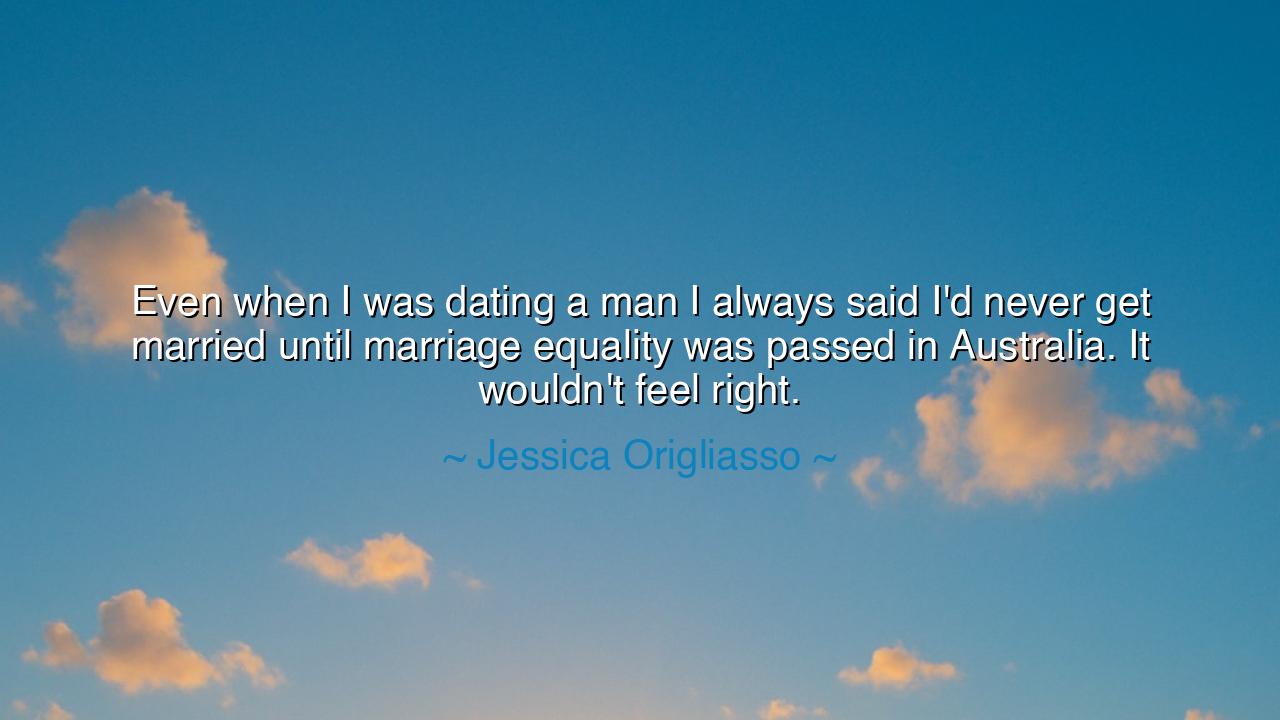
Even when I was dating a man I always said I'd never get married
Even when I was dating a man I always said I'd never get married until marriage equality was passed in Australia. It wouldn't feel right.






The words of Jessica Origliasso, “Even when I was dating a man I always said I'd never get married until marriage equality was passed in Australia. It wouldn't feel right,” resound not merely as a statement of belief, but as a vow of conscience—a promise forged in the fire of justice and compassion. In these words lies the spirit of one who refuses to partake in joy while others are denied it. To stand in solidarity with the oppressed, even when the chains do not bind oneself, is among the highest acts of moral courage. This is not the voice of rebellion for its own sake, but of principle, the sacred kind that honors truth over comfort, integrity over ease.
To the ancients, such resolve would have been seen as a mark of virtue—a rare harmony between thought, word, and deed. For it is easy to speak of equality when it costs us nothing, but to restrain one’s own desires in pursuit of justice—that is the way of the wise. In the old temples of Greece, philosophers taught that the soul must be aligned with what is good for the whole, not just for the self. Jessica’s vow reflects this timeless wisdom: she could not celebrate her own union while others were forbidden theirs. She understood that love, if it is to be true, must be shared in both joy and struggle, until all hearts are free to love without shame.
The origin of her words rests in a time of division and awakening. Australia, a land of vast horizons and ancient songlines, stood in the shadow of inequality. For many years, same-sex couples were denied the right to marry—to bind their love in the same sanctity others took for granted. In that age of discord, Origliasso chose to withhold her own joy until equality was made law. Her choice was both a personal sacrifice and a public declaration: that justice cannot be selective, and love cannot be complete while others are excluded from its blessing.
Such a stand recalls the great spirits of history who refused comfort while injustice reigned. Think of Mahatma Gandhi, who wore the humble cloth of his people while others draped themselves in luxury, vowing never to find peace until his nation did. Or Rosa Parks, who sat unmoving on a bus in Montgomery, her simple defiance sparking a fire that would light the path of freedom for millions. Their acts, like Jessica’s, were born not of anger but of conscience—a steadfast refusal to live in peace while others suffered indignity. Each one teaches us that true morality is measured not by how we treat ourselves, but by how deeply we honor the humanity of others.
The heart of this quote beats with the rhythm of solidarity—the recognition that one person’s liberation is bound to another’s. Jessica’s words remind us that it is not enough to be personally free; we must also labor for the freedom of our brothers, our sisters, and all whose hearts yearn for equality. For how can we feast when our neighbors starve? How can we rejoice in love while others must hide theirs? To deny ourselves for the sake of justice is not loss, but the highest form of love—a love that transcends self-interest and joins the eternal chorus of human dignity.
There is also a spiritual beauty in her resolve. To “not feel right” is the whisper of the soul reminding us that morality is not learned but remembered. Deep within, each of us knows when an act aligns—or misaligns—with truth. Jessica listened to that inner voice, the same voice that guided prophets, reformers, and saints throughout the ages. To live by such integrity is to live in alignment with the great moral order of the cosmos, where justice and compassion are the twin stars that guide humanity’s long journey home.
From this, dear reader, take your lesson: do not wait for comfort to do what is right. Let your principles be higher than your pleasures. When the world denies equality, stand firm beside those who suffer, even if it costs you something dear. Let your choices reflect not only who you are, but what you believe should exist for all. When love calls you, let it not blind you to the pain of others, but deepen your empathy for it.
And in your own life, make this your practice: if a system blesses you while cursing another, do not rest until the curse is lifted. Use your voice, your platform, your compassion to build equality—not in words alone, but in daily action. For as Jessica Origliasso teaches, true love does not seek comfort at the expense of justice. It seeks wholeness, fairness, and freedom for every soul under heaven. Only then, when all hearts may love openly, will our celebrations be pure, our unions complete, and our spirits truly at home in the light of what is right.






AAdministratorAdministrator
Welcome, honored guests. Please leave a comment, we will respond soon